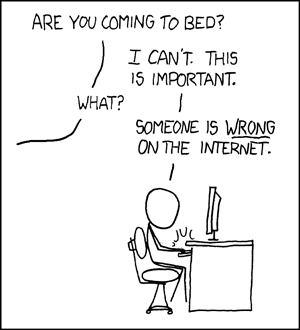That’s not what I said. I said that it is silly to define a group by what people don’t believe.
Why would people be interested in how accurately history is portrayed by other people? It’s the zeitgeist of the internet.

That’s not what I said. I said that it is silly to define a group by what people don’t believe.
Why would people be interested in how accurately history is portrayed by other people? It’s the zeitgeist of the internet.

@heymike3 , This is funnier than talking about charity to people who don’t believe in Bigfoot and about as relevant, but because I think it’s so funny, I’d like to comment on what you shared above, to wit:
I did give it the benefit of the doubt, and thought it was referring to various leaders throughout history. That it got the follow up question was neat. However, some of those examples from before Jesus look like apples and oranges
Maybe, maybe not. Maybe non-protest, like charity, was “invented” in India by predecessors of the authors of the Rig Veda and spread throughout India and was carried to Israel by the Hindu predecessors of the Jews. Next time you see Bharat ask him what he thinks. ![]()
Yes, I think it also depends on how one defines “charity”. If it is just “nonviolent resistance” or "being kind and generous to one’s neighbour (tribe or kin group), I think other people and religions have promoted that. Where the difference with Jesus’s teaching might come in is broader definition of “neighbour” to include “your enemy”, i.e. his command to actively love and do good for one’s enemies. That goes beyond just passively accepting their bad treatment without violence, seems to me.
I keep wondering when it’s time to bring up the idea of “Christian Exceptionalism”, which is very much like “American Exceptionalism.”
Hooray for our side.
Go, team go.
You might be on to something, Terry.
“American Exceptionalism” sounds like a more parochial name for the broader “Doctrine of Discovery” that Western Europeans developed earlier and which was happily inherited by Americans. Our Sunday school has been going through a program titled “Dismantling the Doctrine of Discovery”.
Wish I were in your class!
They are all related, along with Manifest Destiny and “Christian” Nationalism. Various, pernicious forms of cancer we, as a culture, feed and cultivate.
(Do you have a book, notes, bibliography, anything you could PM me?)
EDIT: I just found this website. I’ll start there.
Yes, sadly, there is a long history of packaging one’s culture (which always appears exceptional in one’s own eyes) alongside one’s “Christianity” and riding out to conquer the other in the name of spreading the kingdom to pagans whose thoughts have no worth. The Christian history course I took at Regent last semester was rather sobering. Lots of Charlemagne and evangelism by the sword but it didn’t stop there. In Canada these days, much public reckoning going on surrounding the residential school horror forced on First Nations children until quite recently.
Justo Gonzalez’s The Story of Christianity triggered a reawakening for me to the horrors of Church history… since then I will state unapologetically that reasonable people can disagree about the inerrancy and authority of Scripture.
Yes! - you found the web site. The actual pdf we downloaded and are using as a curriculum can be ordered from that web site you linked - or I think even just obtained for free if you register. I see they want a ‘suggested donation’ of $5 or $10, but just leave that up to you. In order to respect their distribution wishes, I’ll just post a snapshot here of the TOC of that pdf so that you can see what its various lessons are about. It is a Mennonite publication, and draws heavily on the writings of Native Americans who are writing from within the Mennonite tradition.
We share that shame as a nation and a state.
Thanks, Merv!
I’m regularly wowed what you quiet, Jesus-following subversives are doing.
More often than I would like to admit, I feel like a fool for continuing to believe the Bible. Some of the textual issues with Daniel are mind numbing.
But as I’ve said many times, the book is a type of Noah’s ark for me. And then there’s also the case that can be made for what was Jesus’ view of the OT. So for me it deserves the benefit of the doubt, which can be a perfectly reasonable belief.
Not sure I see your point, Terry.
I have no intention to disrobe and parade through the throngs of Biologos Forum participants.
Nothing implied to anyone… the video reminds me of a comment someone made in a philosophy group at university. We watched a film about a nun who was harshly treated by the Church for her scientific studies and work.
Someone in the group said something about what a horror the Church is. The group leader asked if anyone wanted to respond knowing that one or two of us were Christians. I was quiet. Looking back, I might have said the Church is a real whore, but it is the one who Christ died for to make his bride.
Some pretty amazing parallels to Eve’s deception and Christ as the second Adam.
“Let your conversation be always full of grace, seasoned with salt, so that you may know how to answer everyone.” -Colossians 4:6
This is a place for gracious dialogue about science and faith. Please read our FAQ/Guidelines before posting.